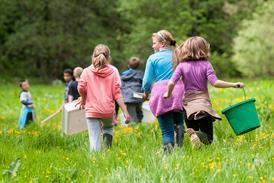Schools in England will be able to apply for grants to take pupils aged 11 and above to visit partner schools around the world, the Education Secretary has announced.

The £2.5 million funding programme is in partnership with the British Council and will be principally focused on supporting children from disadvantaged backgrounds.
To make the scheme as accessible as possible, the Department for Education (DfE) said there will be a simple application process, grants to cover the administrative cost of organising trips, and seminars to help schools to find partner institutions abroad.
In a statement, the DfE said the programme will be focused on supporting children from disadvantaged backgrounds and will give them the chance to experience different cultures, improve language skills and built independence, character and resilience. It is estimated that trips could be funded for 2,900 pupils.
The new scheme will build on the government’s work to encourage pupils to study a foreign language, the DfE said, and will see students encouraged to stay with host families abroad, wherever possible, to maximise their opportunity to practice language skills and become fully immersed in another culture.
Thoughts on the funding
Education secretary, Damian Hinds, said: “I want every child to have a world-class education, and that includes the opportunity to experience other cultures and got to places they wouldn’t normally visit – whether that’s practicing their Mandarin in China or learning about American History in the US.
“This investment will help schools who may not have much experience organising trips abroad to ensure their pupils don’t miss out on all the fantastic benefits these experiences can bring, encouraging children to broaden their horizons and aim high throughout their education and beyond.”
Sir Ciarán Devane, chief executive of the British Council, added: “Pupils keep the memory of a school trip abroad for the rest of their lives – it is an important first step in understanding the world.
“It encourages children to think about working and studying overseas and sows the seeds of international co-operation that we encourage in young people all over the world.”
Responses to the announcement
The announcement has led to a range of responses from organisations and advisors across the country that already recognise the value of school trips.
Asa Gurden, chairman of the Learning Away Consortium and Head of Scout Adventures, said: “Through our research, we know that residential experiences improve students’ engagement with learning as well as their knowledge, skills and understanding. They improve relationships, resilience, self-confidence and wellbeing and boost cohesion and a sense of belonging.
“This is a very welcome announcement from Damian Hinds MP, however just one in five pupils currently have the chance to take part in a school residential experience, so £2.5m funding is just a drop in the ocean. We would like to see more children benefiting from these opportunities.”
Kim Somerville, chief executive officer of the Council for Learning Outside the Classroom, added: “Our vision is simple, we want more children and young people from all backgrounds to benefit from the life-changing experiences a residential, be it in the UK or overseas, can offer.
“Our research provides hard evidence of the profound benefits that school residential experiences can bring. We hope this funding is the start of an increased focus on the value of the wider education experience beyond the classroom walls.”
Schools wishing to register their interest can visit, www.britishcouncil.org/school-resources/exchanges.









